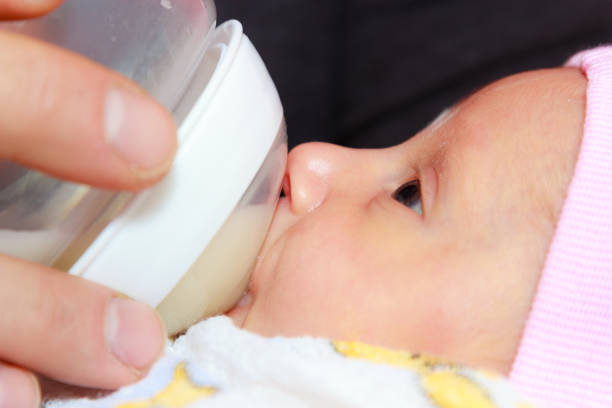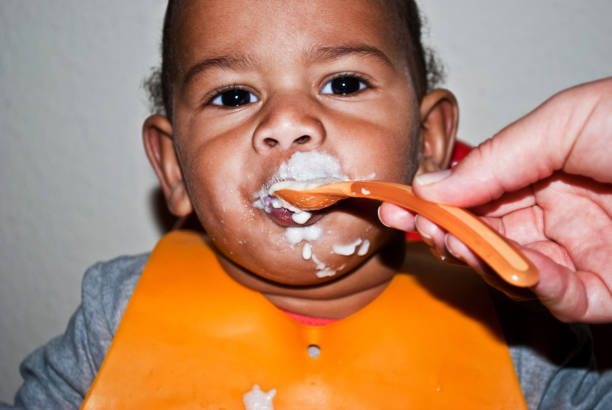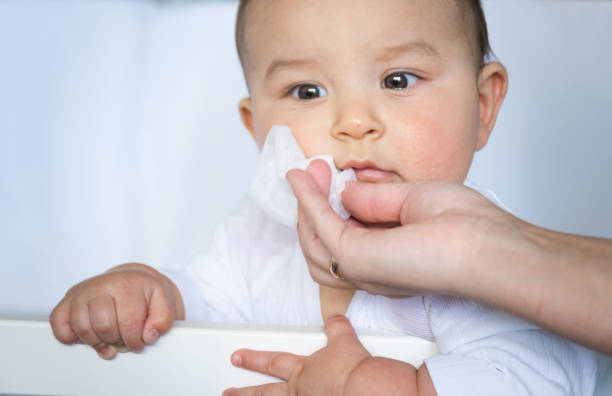Babies are known to spit up milk, and it can be concerning when it appears curdled. Parents may wonder why their baby spitting and if it is normal. While it can be alarming, babies stop spitting of up curdled milk is usually not a cause for concern.
There are several reasons why a baby may spit curdled milk. One reason is that the milk may have mixed with stomach acid, causing it to curdle. Another reason is that the the baby’s spit up they may have eaten too quickly, causing them to swallow air along with the milk. This can lead to the milk being pushed back up and out of their mouth. Additionally, some babies have an immature digestive system, which can cause them to spit up more frequently.
It is important to note that occasional spitting up is normal for babies, and it typically resolves on its own. However, if a baby is spitting up excessively or appears to be in discomfort, it may be a sign of an underlying issue. Parents should consult with their pediatrician if they have any concerns about their baby’s spitting up.
Understanding Baby’s Digestive System

Babies’ digestive systems are not fully developed when they are born. The baby’s digestive system matures only as the baby grows and develops. This means that babies often experience digestive issues, including spitting up curdled milk.
The digestive system is responsible for breaking down food and absorbing nutrients. The digestive process starts in the mouth, where food is chewed and mixed with saliva. The food then travels down the esophagus and into the stomach. In the stomach, food is mixed with stomach acid and digestive enzymes. The stomach acid helps to break down the food and kill any bacteria that may be present.
After the food is broken down in the stomach, it moves into the small intestine. In the small intestine, nutrients are absorbed into the bloodstream. The leftover waste materials travel to the big intestine where they are eventually removed as stool from the baby’s body.
In babies, the digestive system is still developing, and the muscles that control the flow of food in the digestive tract may not be fully developed. This can lead to food moving back up into the esophagus and out of the mouth. This is known as spitting up or reflux.
Spitting up is common in babies, especially after feeding. It can be caused by overfeeding, swallowing air while feeding, or a weak lower esophageal sphincter. Spitting up is usually not a cause for concern unless it is accompanied by other symptoms, such as poor weight gain or difficulty breathing.
In summary, babies’ digestive systems are still developing, which can lead to spitting up curdled milk. This is usually not a cause for concern unless it is accompanied by other symptoms.
What is Curdled Milk?

Curdled milk is milk that has clumped together and formed lumps or curds. This can happen when the milk is exposed to acidic substances, such as stomach acid, or when it is heated too quickly. Curdled milk has a thicker, chunkier consistency than regular milk and can have a sour taste.
When baby spitting up curdled, it means that the milk has mixed with the stomach acid and has started to curdle. This is a common occurrence in babies and is usually nothing to worry about.
It is important to note that curdled milk is different from spoiled milk. Spoiled milk has a foul odor and taste and should not be consumed. Curdled milk, on the other hand, is safe to consume and can even be used in cooking and baking.
Overall, curdled milk is a natural process that occurs most babies when milk is exposed to acidic substances. Curdled milk vomited up by a baby is typically nothing to worry about and is merely a typical sign of regular digestion.
Why Does My Baby Spit Up Curdled Milk?

Babies spitting up curdled milk is a common occurrence, and it can be caused by various factors. Here are some possible reasons why your baby may be spitting up curdled milk.
Feeding Issues
One of the most common reasons for a a baby’s doctor to spit up curdled milk is overfeeding. If a baby is fed too much, their stomach may not be able to handle the excess milk, causing them to spit up. Additionally, if a baby is fed too quickly, they may swallow air, which can lead to spitting up.
Another feeding issue that can cause a baby to spit up curdled milk is not burping them enough. Burping helps release any air that may have been swallowed during a feeding, which can reduce the chances of spitting up.
Gastroesophageal Reflux Disease (GERD)
GERD is a disorder where the esophagus becomes irritated and uncomfortable when stomach acid rushes back up into it. In babies, this can lead to spitting up curdled milk, as the acidic stomach fluid mixes with the milk.
If a baby has GERD, they may also experience other symptoms such as fussiness, difficulty sleeping, and arching their back during feedings. If you suspect your baby has GERD, it’s important to talk to their pediatrician.
Milk Protein Allergy
Some babies may have an allergy or intolerance to the proteins found in cow’s milk, which can cause them to spit up curdled milk. This is because their digestive system may not be able to properly break down the milk proteins, leading to discomfort and spitting up.
Other symptoms of a milk protein allergy or intolerance in young babies may include diarrhea, eczema, and blood in their stool. If you suspect your baby has a milk protein allergy, talk to their pediatrician about alternative feeding options.
In summary, there are several reasons why a baby may spit up curdled milk, including feeding issues, GERD, and milk protein allergy. If you have concerns about your baby’s spitting up, it’s important to talk to their pediatrician to rule out any underlying medical conditions.
When Should I Be Concerned?

If your baby is spitting up curdled milk, it can be concerning for parents. However, it is usually not a cause for alarm. In most cases, spitting up is a normal part of a baby’s development and does not indicate any underlying health issues. However, there are some situations where you should be concerned and speak to your pediatrician.
Excessive Spitting Up
If your baby is spitting up more than usual or you notice a sudden increase in the frequency or volume of your baby’s spit-up, it may be a cause for concern. The condition gastroesophageal reflux disease (GERD), in which stomach acid rushes back into the esophagus and causes discomfort and irritation, can be indicated by excessive spitting up. Other signs of GERD may include fussiness, arching of the back, and difficulty feeding.
Associated Symptoms
If your baby is spitting up curdled milk and also experiencing other symptoms, such as coughing, wheezing, or breathing difficulties, it may be a sign of a more serious condition, such as aspiration or pneumonia. In these cases, it is essential to seek medical attention immediately.
Failure to Gain Weight
If your baby is spitting up curdled milk and not gaining weight as expected, it may be a sign of an underlying health issue. Inadequate weight gain can be a sign of feeding difficulties, such as latching problems or tongue-tie. In some cases, it may also be a sign of a more serious condition, such as a metabolic disorder or congenital heart disease.
If you are concerned about your baby’s spitting up, it is essential to speak to your pediatrician. Your doctor can help determine the underlying cause of your baby’s spitting up and recommend appropriate treatment options. In most cases, spitting up is a normal part of a baby’s development and does not require medical intervention. However, if you notice any concerning symptoms or changes in your baby’s behavior, it is always best to seek medical attention.
Preventing and Managing Baby’s Spitting Up

Babies spitting up curdled milk can be a common occurrence, but it can be concerning for parents. Here are some techniques to prevent and manage baby’s spitting up.
Feeding Techniques
One of the most effective ways to prevent spitting up is to adjust the feeding technique. Here are some techniques to try:
- Keep the baby upright: Feeding the baby in an upright position can reduce the amount of air swallowed, which can lead to spitting up.
- Feed smaller amounts more frequently: Overfeeding can cause the baby to spit up. Feeding smaller amounts more frequently can help the baby digest the milk better.
- Burp the baby: Burping the baby after every feeding can help release any trapped air in the stomach and reduce the chances of spitting up.
- Avoid active play after feeding: Active play after feeding can cause the milk to come back up. It is best to wait at least 30 minutes before engaging in any active play.
Dietary Changes
Breastfeeding mothers can try changing their own diet to reduce the chance of spitting up. Here are some dietary changes to consider:
- Avoid spicy and acidic foods: Spicy and acidic foods can irritate the baby’s stomach and cause spitting up.
- Cut down on caffeine: Caffeine can be passed through breast milk and can cause the baby to be irritable and fussy, which can lead to spitting up.
- Avoid dairy products: Some babies can be sensitive to dairy products, which can cause spitting up.
Medical Interventions
If the spitting up persists, parents should consult with their pediatrician. Here are some medical interventions that can be recommended:
- Thickening the milk: Thickening the milk with rice cereal or other thickeners can help the baby keep the milk down.
- Medications: Medications can be prescribed to reduce the amount of acid in the baby’s stomach, which can reduce the chance of spitting up.
- Referral to a specialist: If the spitting up is severe, the pediatrician may refer the baby to a specialist for further evaluation and treatment.
By implementing these techniques, parents can prevent and manage their baby’s spitting up. It is important to consult with a pediatrician if the spitting up persists or if there are concerns about the baby’s health.
Conclusion

In conclusion, spitting up curdled milk is a common occurrence in infants and is usually not a cause for concern. It is important for parents to understand that spitting up is a natural process that helps babies get rid of excess air and milk. If a newborn occasionally spits up curdled milk, parents shouldn’t panic.
However, if the baby is spitting up excessively or the milk appears to be curdled every time, it could be a sign of an underlying medical condition. Parents should consult a pediatrician if they have any concerns about their baby’s spitting up.
Some common causes of spitting up curdled milk include overfeeding, feeding too quickly, and acid reflux. Parents can take steps to reduce the likelihood of spitting curdled spit up by feeding their baby smaller, more frequent meals, burping their baby frequently during feedings, and keeping their baby in an upright position after feedings.
Overall, healthy babies spitting up curdled milk is a normal part of infancy and usually nothing to worry about. However, if parents have any concerns about their baby’s spitting up, they should consult a pediatrician for guidance and advice.
Frequently Asked Questions
Why is my baby spitting up curdled milk frequently?
Babies spit up for a variety of reasons, and it’s often normal spit up and usually nothing to worry about. However, if your baby is spitting up curdled milk frequently, it could be a sign of a problem. Some possible causes of frequent spitting up include overfeeding, an immature digestive system, or a medical condition such as gastroesophageal reflux disease (GERD).
What does it mean when milk is curdled?
When milk is curdled, it means that the proteins in the milk have coagulated, forming lumps or clumps. In the case of baby spit-up, curdled milk is usually caused by the stomach acid reacting with the milk in the baby’s stomach.
Is curdled milk bad?
Curdled milk is not harmful to your your baby’s growth, but it can be a sign of an underlying problem. If your baby is spitting up curdled milk frequently, it’s a good idea to talk to your pediatrician to rule out any serious medical conditions.
How do I stop my baby from spitting out milk?
There are a few things you can do to help reduce the amount of spit-up your baby produces. Try feeding your baby smaller amounts more frequently, burping your baby frequently during and after feedings, and keeping your baby upright for at least 30 minutes after feeding.
Why does my breastfed baby spit up curdled milk?
Breastfed babies can spit up curdled milk just like formula-fed babies. It’s usually nothing to worry about, but if your baby is spitting up frequently or seems uncomfortable, it’s a good idea to talk to your pediatrician.
What should I do if my baby spits up thick white mucus?
If your baby is spitting up thick white mucus, it could be a sign of a respiratory infection or other medical condition. It’s a good idea to talk to your pediatrician to rule out any serious problems.


 PARENTING TIPS
PARENTING TIPS PREGNANCY
PREGNANCY BABY CARE
BABY CARE TODDLERS
TODDLERS TEENS
TEENS HEALTH CARE
HEALTH CARE ACTIVITIES & CRAFTS
ACTIVITIES & CRAFTS


